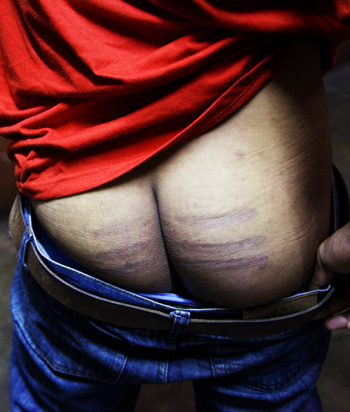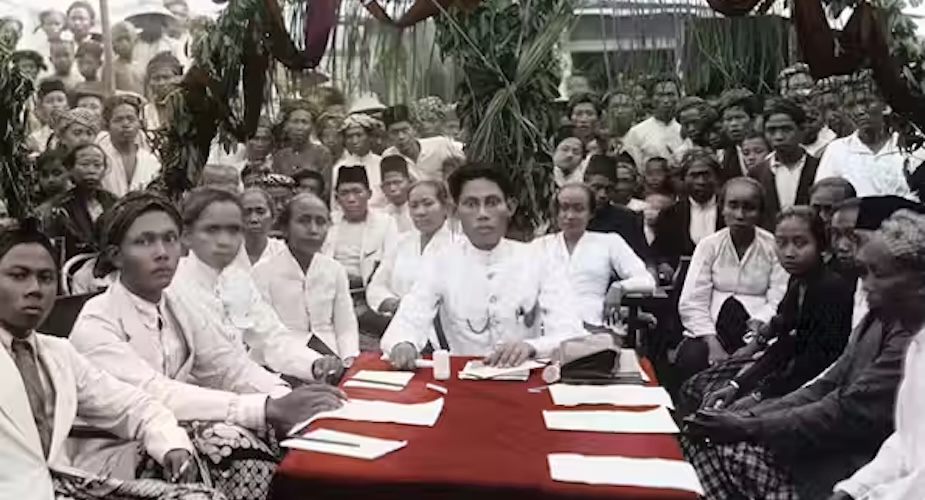Time is running out for SBY to get his house in order
Genevieve Woods
An irregular migrant worker held in the Tanjung Pinang holding centre shows bruises from the caning he received in MalaysiaHenri Ismail/Poros Photos |
In October 2010, Indonesia faced a diplomatic milestone – the inaugural visit of President Susilo Bambang Yudhoyono (SBY) to The Netherlands. The visit was to be an important step in rebuilding ties between Indonesia and its former colonisers, marking the first time in more than 40 years than an Indonesian head of state had visited that country.
But in a dramatic turn of events, just minutes before the plane was due to depart, the president decided to cancel his visit. The decision was so unexpected that members of the presidential entourage already waiting on board the plane were forced to disembark and join their leader for an emergency press conference at the airport.
The president’s visit would have placed him at risk of arrest by Dutch authorities, as a group of separatists from the Republic of South Maluku had commenced legal proceedings against him in The Hague District Court for gross violations of human rights. Outraged by the indignity of the threat, the president protested against the proceedings: ‘What I cannot accept is if the president of Indonesia visits the Netherlands at the invitation of the Queen ... then the court may decide to arrest that president.’ The Dutch government, meanwhile, claimed that the president was protected by diplomatic immunity and could not have been taken into custody, and the case against him was dismissed in court just one day after SBY had been due to arrive.
As long as SBY remains president, he maintains immunity from prosecution, as the Dutch government suggests. But as he draws toward the end of his final term, the question arises: will he be forced to face the consequences of his failure to take a more serious position against human rights violations during his time in office?
Taking it out of Indonesian hands
Indonesia is particularly susceptible to a growing trend in international law – the prosecution of human rights abuses in foreign courts. For international prosecution to be successful, the nation of origin of the accused must be unwilling or unable to prosecute. Indonesia continually fits this description, as recent high-profile failures to ensure justice for victims of human rights abuses have cast doubt on the impartiality and professionalism of Indonesian courts.
Following the notoriously unsuccessful East Timor tribunals in the Indonesian Human Rights Court in 2004, the President of the European Union, the United Nations High Commissioner for Human Rights and the General Secretary of the United Nations all publicly stated that they believe Indonesian courts are unable to provide justice for gross violations of human rights. This high-profile criticism has had a serious impact on Indonesia’s international reputation.
The issue once again came to the forefront of the global media agenda when cases of torture in Papua were publicised and allowed to go unpunished. In January 2011, three soldiers caught on video torturing two Papuan men were each sentenced to less than ten months imprisonment. The verdict caused outrage amongst the global media and NGO activists, who had not only heard about the incident, but had actually watched it themselves on YouTube as the video went viral. The global community’s indignation over the Indonesian judicial system’s failure to respond in a way that recognised the gravity of the situation was amplified by the horror of witnessing torture first hand.
As human rights abuses in Indonesia begin to reach a wider audience, foreign governments find it increasingly difficult to remain silent. The more Indonesian courts are seen to be incapable of guaranteeing justice, the more likely it is that foreign nations will come under pressure to make use of the increasing scope of international law and take Indonesian prosecutions into their own hands.
A president in the docks?
SBY is not the only Indonesian official at risk of overseas prosecution, but he is by far the most high-profile. And while, for now, he has full immunity from prosecution, upon leaving office he will only be entitled to the significantly weaker protections afforded to a former head of state – which have been waived in other international cases where gross violations of human rights have been at issue. So, once his term in office draws to an end, the president could be forced to choose his travel destinations carefully.
Countries as diverse as the UK, the Netherlands, the USA, Spain and Belgium have initiated proceedings against former heads of state in the past. Australia followed suit in 2011, filing charges against the president of Sri Lanka for war crimes. Jennifer Robinson, a human rights specialist based in London, has told the media that several groups are currently preparing cases against the president for crimes against humanity. According to Robinson, if the president were to travel to London after leaving office in 2014, he would face a significant risk of indictment, even though he has not been directly involved in individual acts of human rights abuse. She explained the legal basis for the threat of action: ‘Under the doctrine of command responsibility, political and military leaders who fail to take action against their subordinates for human rights violations can themselves be found responsible.’
By failing to ensure justice for victims of human rights abuses in Indonesia, SBY has made himself vulnerable to international prosecution. But, ultimately, the president remains in control of his own destiny because there is still time to undertake further legal reform. If SBY chooses to champion the rights of victims, he will increase his chances of avoiding a situation where he finds himself confined to Indonesia for fear of foreign prosecution – and in the process, bring the perpetrators to justice.
Genevieve Woods (woodsgenevieve@gmail.com) is an Arts/Law student at the University of Sydney. She has just finished her Honours year in Indonesian Studies.












